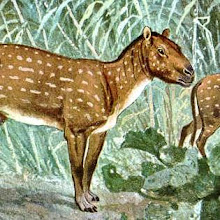It has to do mostly with "The Lord of The Flies." I read this book for LA class and finished my first reading of it in one day. I forgot some of the details and read it again in two days. If you have read this book before, you may know where I am going with this. Otherwise, I will tell you. These British boys are trapped on an island and have to form a society to survive. My reasoning for not liking the word "beast" in this connotation, the other connotation is just fine, is because of what happens on that island. It all started when the younger kids, the “littluns” were having nightmares about a strange creature that was somewhat like a snake. Then, another beast came from water and the older kids were starting to believe it was real. They really believed the beast was real when Sam and Eric thought they saw a beast from air and Jack tried to appease it with a pig’s head on a stick.
Simon found out two things. The first is that the beast Samneric, Sam and Eric, thought they saw was just a dead parachutist. The other was that the real beast would have no power if they knew what it truly was. Unfortunately, the kids became frenzied and killed Simon, thinking that he was the beast. If you remember reading this book, you know who the beast really was. It was Beelzebub, der Teufel. I hope that you can guess what I mean by these, because I’m not saying it in English. I’m using to saying the name in German and you can look it up here: http://www.dict.cc/. I have a feeling someone is going to challenge me on this. If you wish to debate me, leave a comment and I will respond as another comment. Regardless of what you say, I doubt you will sway my opinion, I dare you to try.
Added on 10/03/09:
Okay, my post is poorly written... I don't provide enough evidence and this isn't completely directed at beast, it is more about slang words that, in general, have connatations that were originally bad, now have a meaning that is good that has nothing to do with the original connatation. "Sick" is an example of this.
Another grammatically related thing, I'm pretty sure "beast" in its slang version has been used as an adjective and a noun. Pick one and assign appropriate endings to change it to the other part of speech.
One last comment, Mikey J did sway my opinion, but not in the way I was intending. I don't watch sports that much so

Anyway, I don't watch sports much, if at all, so I had no idea where this slang term came from. Mikey J, your description made sense, but in some ways. "Beast"'s connatation is something like "a wild animal." For sports and physical challenges, this analogy could work well. I know that sports require strategy, wild animals have to be cunning, this could work too. As for purely mental things, did you ever see wolves learning advanced math? Wild animals need to stay in shape or they'll starve. These things arise from not having to do as much physical work, which wild animals do plenty of. I can understand physical and mental combined, but if you gave a random wolf your trig test, it wouldn't know what to do with it. So, if you were a "beast" in Friday's game, you did well, but if you were a "beast" on the test, you flunked it. That's how I seem to intepret it. Mikey J, feel free to challenge this one if you wish.
Photo from here

My response was so massive, anything else in this text box would start to feel claustrophobic.
ReplyDeleteIt has been relocated to:
http://mikeyj-in-the-morning.blogspot.com/2009/10/sweet-cool-tights.html
Well, "beast" used to mean physical or biological dominance, but its wide use has been extended to just about anything.
ReplyDeleteJust today, someone say my grades and said "Beast"
Just to add a point. English words can often be used as not only adjectives and nouns, but also verbs without a change.
ReplyDelete1.) I am swimming (swimming is the action or verb)
2.) He was a swimming champion (swimming, the adjective, describes champion, the noun)
3.) She is good at swimming (swimming, in this case, is an noun as it is being acted upon by the verb "is")
boom, roasted beast.
Goody, I have a response to your comment. It is located at "http://pterygotus.blogspot.com/2009/10/swimming-isnt-right.html"
ReplyDelete